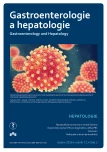-
Medical journals
- Career
Treatment of complicated Crohn’s disease with vedolizumab
Authors: B. Pipek 1; P. Falt 1–3
Authors‘ workplace: Centrum péče o zažívací trakt, Vítkovická nemocnice, a. s., Ostrava 1; LF OU v Ostravě 2; Katedra interních oborů, LF UK v Hradci Králové 3
Published in: Gastroent Hepatol 2018; 72(2): 143-147
Category: IBD: Case Report
doi: https://doi.org/10.14735/amgh2018csgh.info02Overview
Crohn‘s disease is a chronic inflammatory disease of the digestive tract with an unclear etiology and severe exacerbations and complications in many patients. Vedolizumab is a monoclonal antibody against α4β7integrin receptors on the surface of activated leukocytes and is a relatively new biological treatment available in the Czech Republic since 2016. It has high selectivity for the gastrointestinal tract and prevents lymphocytes from moving from the capillary system into the gastrointestinal tract with a relatively low incidence of side effects. It is indicated for the treatment of adult patients with moderate to severe active Crohn’s disease and ulcerative colitis, who either do not tolerate or have inadequately responded or failed to respond to conventional therapy, such as anti-TNF therapy. We present a case report of a patient with a severe and complicated form of Crohn’s disease, in whom conventional treatments, such as steroid and anti-TNF therapy and surgical resection, failed, and who is now being successfully treated with vedolizumab. The patient’s clinical condition improved after vedolizumab treatment and corticosteroid therapy has stopped. Currently, the patient has been on vedolizumab for 1 year and shows deep remission of the disease.
Key words:
Crohn’s disease – vedolizumab – ileocecal resection – endoscopic stricture dilatation – biodegradable stent
The authors declare they have no potential conflicts of interest concerning drugs, products, or services used in the study.
The Editorial Board declares that the manuscript met the ICMJE „uniform requirements“ for biomedical papers.Submitted:
9. 8. 2017Accepted:
27. 9. 2017
Sources
1. Lukáš M. Vedolizumab v léčbě Crohnovy choroby. Gastroent Hepatol 2015; 69 (2): 146–150. doi: 10.14735/amgh2015146.
2. Bortlík M. Vedolizumab – nová antiintegrinová protilátka s vysokou gastrointestinální selektivitou. Gastroent Hepatol 2014; 68 (6): 481–484. doi: 10.14735/amgh2014481.
3. Falt P. Léčba vedolizumabem u pacientů s idiopatickými střevními záněty v České republice. Gastroent Hepatol 2017; 71 (1): 19–23. doi: 10.14735/amgh201719.
4. Sandborn WJ, Feagan BG, Rutgeerts P et al. Vedolizumab as induction and maintence therapy for Crohn’s disease. N Engl J Med 2013; 369 (8): 711–721. doi: 10.1056/NEJMoa1215739.
5. Sands BE, Feagan BG, Rutgeerts P et al. Effects of vedolizumab induction therapy for pacients with Crohn’s disease in whom tumor necrosis factor antagonist treatment failed. Gastroenterology 2014; 147 (3): 618–627. doi: 10.1053/j.gastro.2014.05.008.
6. Lam MCW, Fu N, Bressler B et al. Vedolizumab for induction of remission in Crohn‘s disease in adults. A systematic review and meta analysis. JCC 2015: S227. Abstract P301.
7. Amiot A, Grimaud JC, Peyrin-Biroulet L et al. Effectiveness and safety of vedolizumab induction therapy for pacients with inflammatory bowel disease. Clin Gastroenterol Hepatol 2016; 14 (11): 1593–1601. doi: 10.1016/j.cgh.2016.02.016.
8. Rejchrt S, Kopacova M, Brozik J et al. Biodegradable stents for treatment of benign stenoses of small and large intestines. Endoscopy 2011; 43 (10): 911–917. doi: 10.1055/s-0030-1256405.
9. Karstensen JG, Christensen KR, Brynskov J et al. Biodegradable stents for the tratment of bowel strictures in Crohn‘s disease: technical results and challenges. Endosc Int Open 2016; 4 (3): E296–E300. doi: 10.1055/s-0042-101940.
Labels
Paediatric gastroenterology Gastroenterology and hepatology Surgery
Article was published inGastroenterology and Hepatology

2018 Issue 2-
All articles in this issue
- Acute kidney injury in patients with acute pancreatitis
- Treatment of an adenoma of the ascending colon with the non-lifting sign via a combination of endoscopic mucosal resection and full-thickness resection
- Sleeve gastrectomy – a popular bariatric method to treat severe obesity and type 2 diabetes
- Esomeprazole – S-isomer of omeprazole with more favorable pharmacological properties and stronger pharmacodynamic effect
- Gastrointestinal symptomatology of familial Mediterranean fever – is this a problem also in Central Europe?
- Anniversary of Professor Zdenek Marecek
- View of the XXIIIrd Gastroforum, Strbske Pleso, 2018
- 6th Conference of Central European Hepatologic Col laboration
- The selection from international journals
- Hepatology
- Guidelines of the Czech Society of Hepatology for diagnosis and treatment of primary biliary cholangitis
- A rare cause of increased abdominal size
- Terlipressin remains indispensable in two indications
- Treatment of complicated Crohn’s disease with vedolizumab
- Hepatic cyst infection as a source of sepsis in liver polycystosis
- Hepatocellular carcinoma in central Slovakia – tertiary referral centre experience with 207 patients
- Gastroenterology and Hepatology
- Journal archive
- Current issue
- Online only
- About the journal
Most read in this issue- Terlipressin remains indispensable in two indications
- Guidelines of the Czech Society of Hepatology for diagnosis and treatment of primary biliary cholangitis
- Hepatic cyst infection as a source of sepsis in liver polycystosis
- A rare cause of increased abdominal size
Login#ADS_BOTTOM_SCRIPTS#Forgotten passwordEnter the email address that you registered with. We will send you instructions on how to set a new password.
- Career

